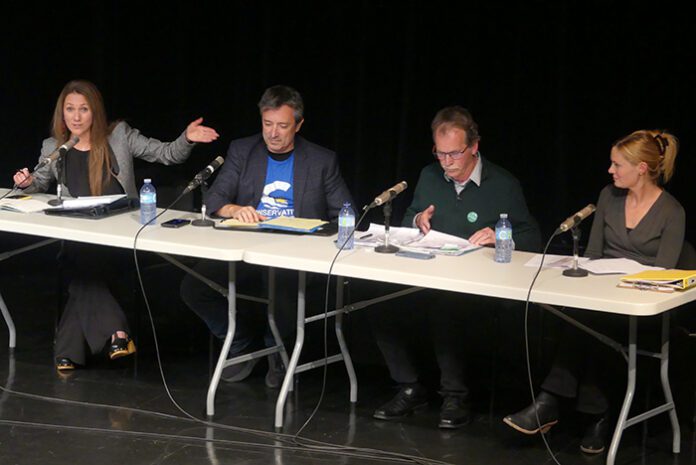From strengthening the healthcare system to childcare, affordable housing and environmental protection, a wide range of topics were touched on by MLA hopefuls at Salt Spring Island’s all-candidates debate Wednesday, Oct. 9.
With advance voting beginning the next day, constituents filled every seat –– and then some –– at ArtSpring for the evening event, moderated by Valeskca San Martin and co-hosted by the Driftwood and the Salt Spring Forum. Independent candidate Amy Haysom shared the stage with David Busch from the BC Conservatives, Rob Botterell of the BC Greens and the NDP’s candidate Sarah Riddell, and after brief opening remarks the four spent most of their time fielding audience questions.
Despite seemingly little daylight between candidates when identifying the riding’s problems, each highlighted a different strategy to solve them; all four agreed there was insufficient affordable housing, for example, but proffered their own ideas about creating more. Riddell advocated for “direct and timely” government investment in affordable housing on public land, as well as landlord protections to nudge new rentals to market.
“We can have factory-built homes [completed] in 12 weeks,” said Riddell. “We also have subsidized [rental] insurance in our platform for landlords, intended to encourage folks to rent out available spaces they already have.”
Haysom praised current Capital Regional District efforts led by Justine Stark on the district’s rural housing pilot project, emphasizing the importance of finding solutions on Salt Spring Island in particular –– and of her personal understanding of the problem as a long-time renter.
“We are struggling,” said Haysom. “And meanwhile, people on a fixed income are spending most of their income on housing. We need alternative housing.”
Busch directed voters to the BC Conservatives’ website, highlighting examples of how bad the problem has become.
“Every time I come to the island over the last decade, I’ve seen more and more of the RVs, more and more of the homelessness,” said Busch. “We have a BC Ferries captain living in an RV because he can’t afford housing out here.”
And Botterell pointed to the Green Party’s proposal to support a non-profit housing fund –– to the tune of $1.5 billion annually.
“That’s what we need, non-market housing,” said Botterell. “And if we hold the balance of power, you can be sure that’s going to be in the confidence and supply agreement.”
As might be expected in a race for a seat open due to the retirement of a popular minority-party MLA –– and one with an independent running without party backing –– candidates largely made their cases through, or in defiance of, recent history and electoral mathematics. Riddell’s answers were often couched in reminders of popular NDP initiatives, while entreating voters not to “split the vote” in such a way that might benefit the Conservatives.
“The last time a popular Green [MLA] stepped down, they lost the seat by a landslide,” said Riddell, advising a vote for her and the NDP party was necessary “if you don’t want to see [BC Conservative] John Rustad as your premier, if you don’t want to bring back plastic bags or straws or level our old growth, or expand LNG or set back reconciliation with First Nations by decades.”
Meanwhile, Botterell opined that “strategic” voting –– “Do I have to vote NDP, although I’d like to vote Green because that will keep the Conservatives out?” –– risked losing the advantages of vocal opposition.
“I understand that,” said Botterell. “But I also want you to think about who can actually hold the government’s feet to the fire, who can actually spend the time with you to work as hard as possible on the housing, on the transportation, on the healthcare, and who is committed to actually have a carbon tax and fight for the environment.”
Haysom urged people to “vote from your heart,” characterizing strategic voting strategies as rhetoric from parties wishing to “maintain the status quo.”
“Strategic, schneegic,” said Haysom. “I will be connecting with all parties outside of the Legislative Assembly; David [Busch] and I had a wonderful carpool together where we had healthy conversation –– it is possible –– about all the key issues. I will be that strong voice in the divided legislature.”
For his part, Busch dipped into the classics.
“I’ve knocked on a lot of doors,” he said, “and asked people, ‘are you better off today than you were four years ago, than you were seven years ago?’ And I see a lot of head shaking. You have a decision to make. Do we want to keep this as a Green riding? Do we want to see the NDP still empowered? Or do you want to see a different approach, so that we can turn around the ever-increasing opioid deaths on our streets, so we can save our healthcare system to make sure it’s there for us today and our kids tomorrow?”
Video of the 90-minute debate can be watched online. Election day is Saturday, Oct. 19; people should consult their voting cards or elections.bc.ca for voting locations.
Today, Oct. 16, is the last day for advance voting at Community Gospel Chapel on Salt Spring, Pender Islands School, Mary Winspear Centre (Sidney) and Stelly’s Secondary School in Saanich.

